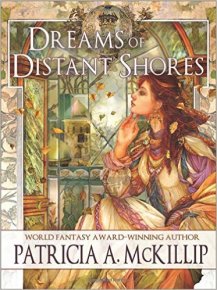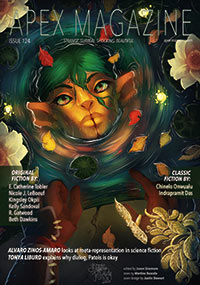Gary K. Wolfe reviews Patricia A. McKillip
Dreams of Distant Shores, Patricia A. McKillip (Tachyon 978-1-61696-218-0, $15.95, 276pp, tp) June 2016.
 For a career of more than 40 years, Patricia McKillip hasn’t been particularly prolific in short fiction, but her generous output of first-rate novels (most recently Kingfisher, reviewed here last month) has more than satisfied a devoted readership. Still, a rare new story collection is something to look forward to, especially when, as with Dreams of Distant Shores, it includes three previously unpublished tales, a long novella all but unavailable since its original 1994 publication, an essay by McKillip on high fantasy, and an appreciative and sharply insightful afterword by Peter Beagle. Part of the reason a collection like this is especially intriguing is that, as McKillip herself points out in her essay, the romantic epic conventions of high fantasy have so often been the basic stuff of her novels, and watching her simultaneously manipulate, celebrate, invert, and challenge those conventions is a large part of her appeal. But there are other forms of fantasy, perhaps more gemlike, that she also seems drawn to, and even though the present collection offers us only six stories in addition to the novella and the non-fiction pieces, it’s enough to make you wonder what more she might be able to do in this area.
For a career of more than 40 years, Patricia McKillip hasn’t been particularly prolific in short fiction, but her generous output of first-rate novels (most recently Kingfisher, reviewed here last month) has more than satisfied a devoted readership. Still, a rare new story collection is something to look forward to, especially when, as with Dreams of Distant Shores, it includes three previously unpublished tales, a long novella all but unavailable since its original 1994 publication, an essay by McKillip on high fantasy, and an appreciative and sharply insightful afterword by Peter Beagle. Part of the reason a collection like this is especially intriguing is that, as McKillip herself points out in her essay, the romantic epic conventions of high fantasy have so often been the basic stuff of her novels, and watching her simultaneously manipulate, celebrate, invert, and challenge those conventions is a large part of her appeal. But there are other forms of fantasy, perhaps more gemlike, that she also seems drawn to, and even though the present collection offers us only six stories in addition to the novella and the non-fiction pieces, it’s enough to make you wonder what more she might be able to do in this area.
Two of the shortest pieces here are a good example of what I mean. The opening story, ‘‘Weird’’, is all inference and apprehension in the best postmodern sense: a man and a woman are hiding out in what seems to be a hotel bathroom, surviving on the snacks stolen from the mini-bar, while he insists she tell him of her weirdest experiences – and while some sort of unnamed apocalypse rages outside, including someone shouting in an unidentified language and pounding on the bathroom door. McKillip offers us just enough resolution to understand a bit more about the characters, but never offers to open that door. There’s a certain sort of fantastic fiction that depends as much on what is withheld as on what is told, and it tends to work best in short forms like this. ‘‘Edith and Henry Go Motoring’’ revisits the ‘‘road not taken’’ sort of ghost story (such as Henry James’s ‘‘The Jolly Corner’’), but with a distinctly haunting twist, as the title couple and their driver come across a remote and apparently abandoned great house, where a spectral figure lures them through its empty rooms. And ‘‘Alien’’, which can be read as a purely mainstream tale, concerns a family’s efforts to grapple with the recently widowed grandmother’s insistence that she’s an alien abductee, and seems to leave no room for a credible resolution – until you read McKillip’s brilliant last line.
One of McKillip’s recurrent themes that becomes evident in the short fiction is the transformative power of art. ‘‘Which Witch’’, one of the funnier stories here (why is it that writers known for elegant prose are suspected of having no humor?) originally appeared in Jonathan Strahan’s Under My Hat and concerns a club band made up of witches, whose familiars sometimes get into the act as well (part of the story is told by the narrator’s familiar, a crow). In ‘‘Mer’’, a carved wooden mermaid is the central image in a tale which quietly stretches out over centuries, as a goddess temporarily inhabits the body of a witch in a fishing community (where, in the contemporary part of the story, local boys try to borrow the mermaid as a wedding prop). The most substantial of these comparatively recent stories is ‘‘The Gorgon in the Cupboard’’, a gorgeous re-imagining of the Medusa myth set among a group of artists who seemed to me (as they apparently did to Peter Beagle in his afterword) to be based on the Pre-Raphaelites, and focusing on a young homeless woman who seems to have walked straight out of one of Thomas Hardy’s direst novels. The longest novella here, ‘‘Something Rich and Strange’’ (originally published in 1994 as part of a series called ‘‘Brian Froud’s Faerielands’’, inspired by Froud paintings), concerns a West Coast artist and arts-and-crafts shop owner and her husband, who get involved with mer-people and an undersea kingdom whose survival is threatened by human incursions. The story unfolds as a kind of mystery – things showing up in the woman’s paintings she doesn’t remember drawing, mysterious strangers with odd powers – but the governing images are again drawn from the arts – not only the painter herself, but a possibly supernatural rock singer and a jewelry-maker. At one point, the protagonist Megan is told that in order to save her husband Jonah from the undersea world, she must draw a staircase and then descend it. It’s a neat image of art as salvation, but also of art as a portal to the immanent magical worlds that McKillip convincingly suggests are nearby, and nearly visible if you squint just right.





